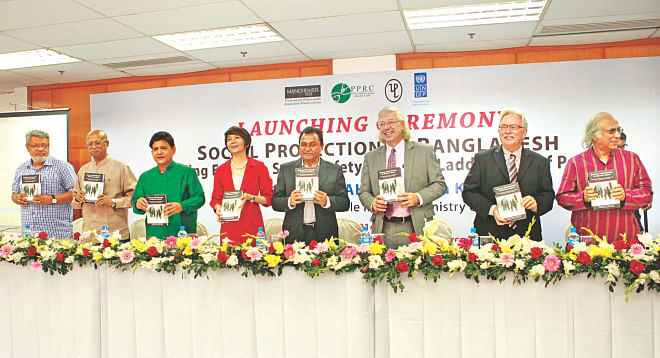UN for immediate social protection in Bangladesh
UN for immediate social protection in Bangladesh

The United Nations yesterday called for sustained political leadership, a sense of urgency in actions, allocation of sufficient national resources, and integrity of the programmes and their implementation, for a comprehensive social protection system.
"This is how Bangladesh can achieve, in record time, the objectives of social protection, of sustainable, equitable economic growth and of middle income status," said Neal Walker, UN resident coordinator in Dhaka.
The UN cannot think of social protection as an issue that is to be addressed over the next several decades, he said.
"In fact, I do understand that effective action may require decades, but it is my view--- that kind of thinking will only lead to failure."
"Let's push for immediate action. Let's define results to be achieved in the next three months, in the next 6 months, over one year and beyond. Let's demand action on those results."
One lesson that Walker has learnt in Bangladesh is that it simply takes longer to get things done here than in many countries he has lived in.
"To achieve sustainable results on an issue as complex as social protection requires us to think, every day, of the results we will define, push and achieve. Without a sense of urgency, the problem resolution and political will, somehow, will stall out."
The UN official spoke at the launch of a book --- Social Protection in Bangladesh: Building Effective Social Safety Nets and Ladders out of Poverty --- at Bangabandhu International Conference Centre.
The event was jointly organised by United Nations Development Programme, University Press Ltd (UPL), Power and Participation Research Centre, Brooks World Poverty Institute and the University of Manchester.
The book, based on an international conference held in Dhaka in 2011, has been edited by Hossain Zillur Rahman, executive chairman of PPRC; David Hulme and Mathilde Maitrot, professors at Brooks World Poverty Institute; and Luigi Peter Ragno, head of Social Protection Programme for UNICEF in Ghana, and published by UPL.
The book provides a timely overview of international lessons, national experiences and reform opportunities as Bangladesh is engaged in the formulation of a national social protection strategy (NSPS), said Pauline Tamesis, country director of UNDP Bangladesh.
"It is evident that social protection is one the necessary conditions for pro-poor economic growth. It can be a catalyst for Bangladesh's aspirations to attain middle income status by 2021."
The UNDP is supporting the government to develop the NSPS.
According to the UN, the country is currently putting nearly 2 percent of its gross domestic product into social protection programmes.
Bangladesh has 80 to 95 social protection programmes operated by 20 ministries, said Prof Hulme.
"These schemes have been successful in disaster management, food relief and income poverty reduction, but they are now not meeting contemporary needs and are not effective and efficient."
"Bangladesh needs an effective social protection system to reduce socially unacceptable levels of poverty and vulnerability."
Planning Minister AHM Mustafa Kamal said at 17 percent, Bangladesh has already brought down the number of people living in extreme poverty close to the world average of 16 percent.
"Hopefully, we will be able to make Bangladesh a hunger-free nation by 2030," he said, calling for investment in education to give people the means to get out of the poverty on their own.
Binayak Sen, research director of Bangladesh Institute of Development Studies, said there would not be a shortage of resources to lift the extreme poor out of poverty.
"Only 3 percent of our national income will be needed to be redistributed to lift all extreme poor out of poverty."
"Bangladesh needs to lift one million families living in extreme poverty every year until 2020. This will not cost more than 0.5 percent of GDP."
The economist said the government should step up efforts to collect more revenue in the form of wealth and property taxes to finance the social protection scheme.
Hossain Zillur said the NSPS would be central to achieving the much-desired middle income status.
"But we don't want to become a middle income country where there is disparity, the poorest live side by side with the richest and the cities are not liveable."
Walker emphasised the importance of leadership, if Bangladesh is to successfully tackle the problem of equitable growth and eliminate poverty.
"We know the issue of social protection is of personal importance to the prime minister; success in achieving sustainable and equitable economic growth towards middle income status will require her serious attention, today and in the future."
Quazi Kholiquzzaman Ahmed, chairman of Palli Karma-Sahayak Foundation, and Mahabub Hossain, executive director of BRAC, also spoke.